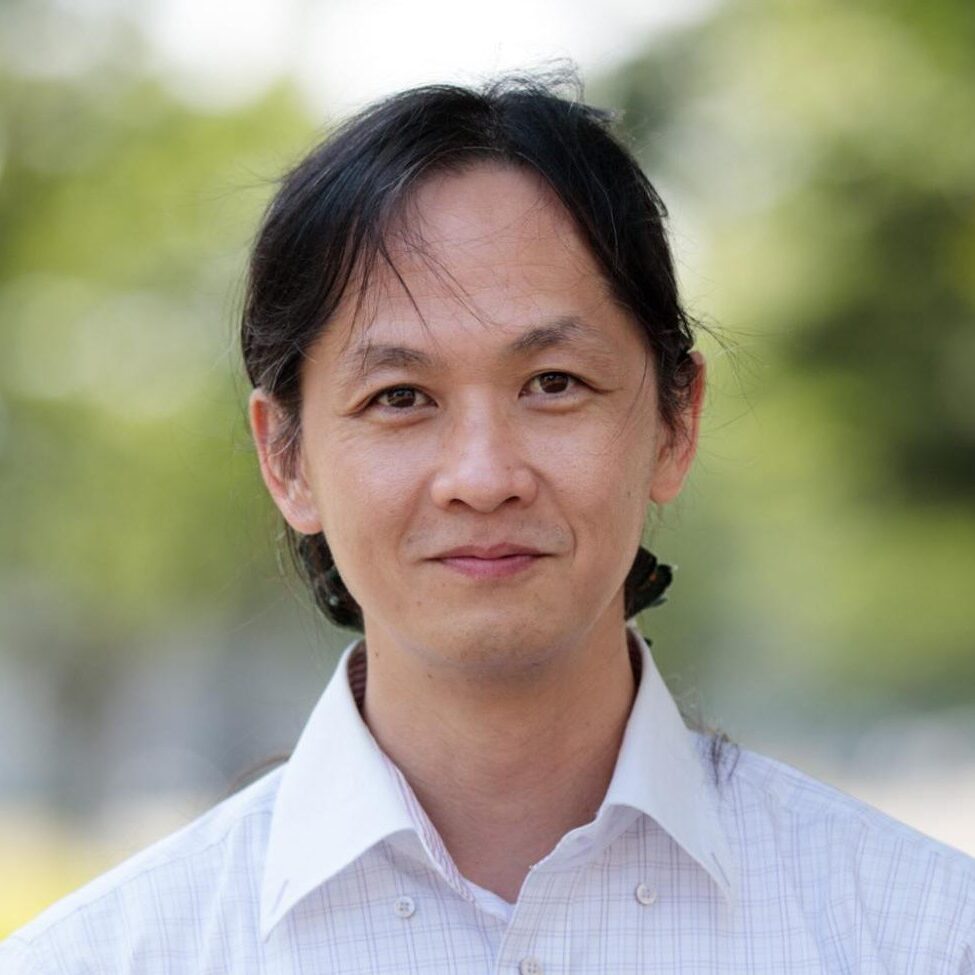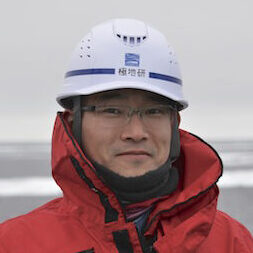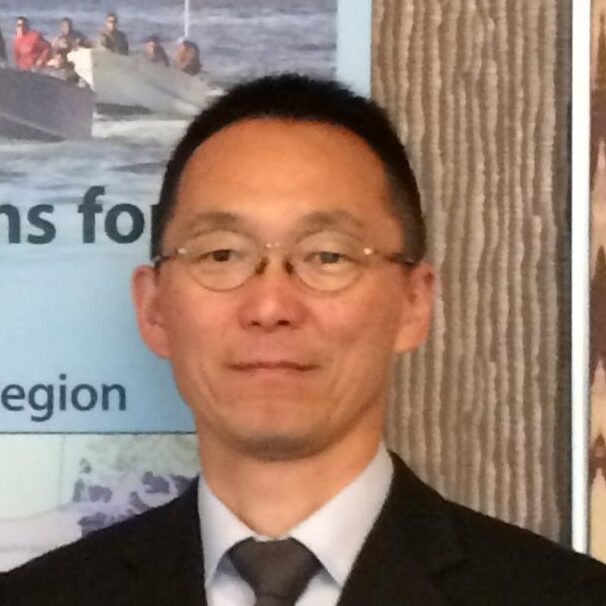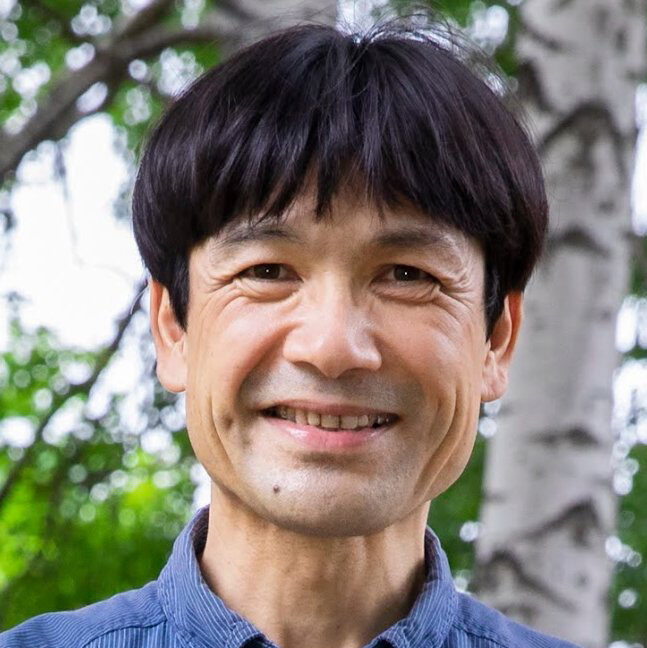Project Overview
Creating Knowledge to Understand Rapid Arctic Change and Benefit Society
The National Institute of Polar Research (NIPR), the Japan Agency for Marine-Earth Science and Technology (JAMSTEC), and Hokkaido University jointly applied to the Ministry of Education, Culture, Sports, Science and Technology (MEXT) for the Arctic Challenge for Sustainability III (ArCS III) project. On March 10, 2025, the project was officially approved, and on April 1, 2025, Japan launched one of its largest Arctic research initiatives to date. The project will run until the end of fiscal year 2029.
The Arctic is the region where the impacts of global warming are most pronounced. Rapid environmental changes in the Arctic are already influencing ecosystems and the environment across the globe, including the mid-latitudes. To address the social issues related to the sustainability of the Arctic society, it is urgent to advance interdisciplinary research, close observational gaps, and improve the reliability of future projections.
ArCS III builds on Japan’s earlier Arctic research efforts, beginning with the GRENE Arctic Climate Change Research Project (2011), followed by ArCS and ArCS II. The new project is organized around three strategic goals, pursued through ten research themes supported by seven research platforms. These platforms include the Arctic Data archive System (ADS) for archiving and sharing observation and analysis results, the new Arctic research vessel Mirai II (to begin operation in 2026), and Earth observation satellites operated by JAXA.
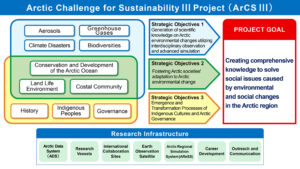
Project Goals and Strategic Objectives
In ArCS III, our overall project goal is:
“To create integrated knowledge that contributes to solving the social challenges arising from environmental and societal changes in the Arctic.”
Here, “integrated knowledge” refers to combining insights from different academic fields — natural sciences, social sciences, and the humanities — to approach complex challenges from multiple perspectives. The aim is not only to link disciplines, but also to generate knowledge that can inform real-world solituions through collaboration among researchers and with local communities.
To achieve this goal, ArCS III has set three strategic objectives:
- Generating Information on Arctic Environmental Change through Interdisciplinary Observation and Advanced Simulation
By integrating high-quality observations, analysis, and numerical models across diverse scientific fields, we seek to improve understanding and prediction of Arctic environmental changes. - Contributing to Societies Adapting to Arctic Environmental Change
We provide knowledge that supports policy-making and the development of sustainable societies, helping communities and people adapt to the impacts of environmental changes. - Understanding the Emergence and Transformation of Indigenous Cultures and Arctic Governance
We exmine the cultures and social systems of people living in the Arctic, studying how they evolve amid rapid transformations, and exploring pathways toward coexistence.
Through this approach, ArCS III evaluates the impacts of rapid Arctic environmental changes on human societies — including Japan — and generates research outcomes that contribute to address societal challenges. By providing scientific knowledge to both domestic and international stakeholders, including the foundations for legal and policy responses to international rule-making, the project seeks to advance integrated knowledge through interdisciplinary and practice-oriented collaboration. In doing so, ArCS III contributes to building a sustainable future for both the Arctic and the entire planet.
Project Management Structure
ArCS III is carried out under a strong collaborative framework. The National Institute of Polar Research (NIPR) serves as the lead institution, with the Japan Agency for Marine-Earth Science and Technology (JAMSTEC) and Hokkaido University acting as co-leads. To ensure smooth operation, the project has established a Project Management Board, an External Expert Committee, an International Advisory Board, and a Secretariat.
The ten research themes of ArCS III each contribute to the project’s three strategic objectives. To coordinate these efforts, three Strategic Objective Coordinators have been appointed, one for each goal. They work closely with the research themes, ensuring that each contributes effectively to the project’s overall goal.
Lead Institution
National Institute of Polar Research
Co-lead Institutions
Japan Agency for Marine-Earth Science and Technology
Hokkaido University
Project Director (PD)
-
 Hiroyasu Hasumi (NIPR)
Hiroyasu Hasumi (NIPR)
Sub-Project Director (SPD)
-
 Jun Inoue (NIPR)
Jun Inoue (NIPR) -
 Takashi Kikuchi (JAMSTEC)
Takashi Kikuchi (JAMSTEC) -
 Shin Sugiyama (Hokkaido University)
Shin Sugiyama (Hokkaido University)
Assistant Project Director(Assistant PD)
-
 Tetsuo Sueyoshi (NIPR)
Tetsuo Sueyoshi (NIPR)
Strategic Goal Coordinator
Eiji Watanabe (JAMSTEC)/ Yoshihiro Iijima (Tokyo Metropolitan University)/ Akamine Jun (Hitotsubashi University)
Project Management Board
To ensure smooth progress of the project, the board discusses and decides on key matters related to project management.
The board is composed of the Project Director (PD), the Sub-Project Director (SPD), the Assistant to the Project Director, and three Strategic Goal Coordinators.
| External Expert Committee Members | |
|---|---|
| Name | Affiliation |
| Megumi Kurebito | Hokkaido Museum of Northern Peoples |
| Toru Nozawa | Okayama University |
| Naomi Harada (Chair) | The University of Tokyo |
| Chisa Mitsuhashi | Miraikan – The National Museum of Emerging Science and Innovation |
| Yutaka Yamauchi | Japan Marine United Corporation |
| Satoru Yamaguchi | National Research Institute for Earth Science and Disaster Resilience |
International Advisory Board (IAB)
International Advisory Board (IAB)
The International Advisory Board is composed of leading figures in Arctic research, including representatives of major international Arctic research projects and heads of research institutions. The board provides advice on the project’s plans and outcomes from an international perspective, ensuring that ArCS III is aligned with global priorities in Arctic research.
To be announced

